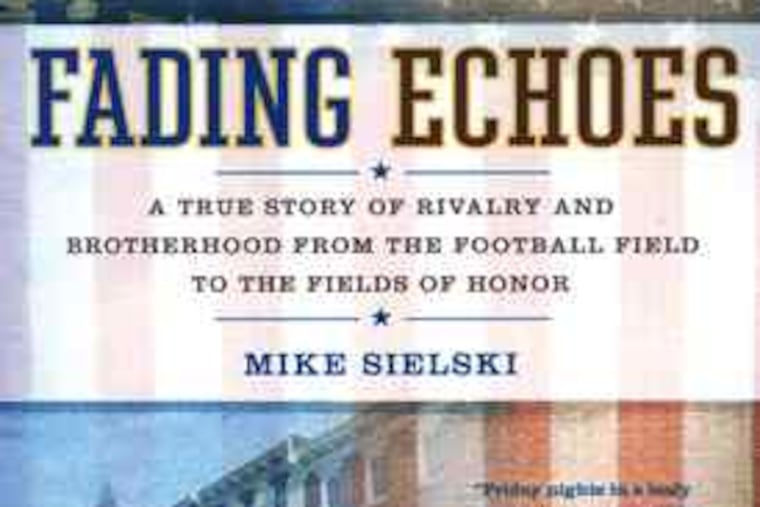Two football heroes go to war
For almost as long as there has been football, people have written about it in terms usually used to describe war, with the violent game often painted as a simulacrum of life-and-death struggles.

A True Story of Rivalry
and Brotherhood From
the Football Field
to the Fields of Honor
By Mike Sielski
Berkley Hardcover. 352 pp. $24.95
nolead ends nolead begins
Reviewed by Derrick Nunnally
For almost as long as there has been football, people have written about it in terms usually used to describe war, with the violent game often painted as a simulacrum of life-and-death struggles.
Onto this well-trod terrain comes Mike Sielski, a sportswriter for the Bucks County Courier Times, with Fading Echoes. Sielski shadows gifted Doylestown athletes Bryan Buckley and Colby Umbrell from their suburban high-school football careers to college athletics and military service in Iraq.
To Sielski's credit, Fading Echoes, which originated with a 2007 newspaper series about Umbrell, avoids the reflexive comparison of football to war, instead bringing the reader along to see how the parallel lives of Buckley and Umbrell carried each through both worlds. But too often, Fading Echoes is a very good war book in need of a better sports editor.
At its best, which is mainly in the sections that take place in Iraq, the book offers vibrant, often-harrowing detail about what Buckley and Umbrell saw thousands of miles away from the Starbucks at the center of their shared suburban hometown.
Often, though, Sielski's authorial voice comes off as too beholden to his reporting notes. This creates a dragging, uneven pace for much of the first half of the story, which focuses on the football teams of Central Bucks East High School and Central Bucks West High School.
High school acquaintances of Buckley and Umbrell with slight importance to the story line are introduced, quoted in brief, and quickly forgotten. The book dwells on each occasion to connect the two, even though by all accounts they knew each other only slightly.
Extended effort goes into recounting the historical contexts of both America's march into the Iraq war and Doylestown's growth as a municipality, and Sielski labors, with wordy melodrama, to convey a reverence for the "bucolic" Bucks County setting as prototypically American. The football season brings "timeless customs and new beginnings" to Doylestown, which in turn heeds the "universally accepted truth regarding American small towns" that each team has a corresponding local watering hole (a dubious assertion, since Pennsylvania - like many states - has some dry towns).
Most damaging to the narrative flow is its reliance on play-by-play narration in an attempt to tell the stories of a collection of games from the high school athletes' sporting careers. As a neophyte sportswriter, Sielski covered many of the games played by Buckley and Umbrell. He interviewed his subjects as young men, walked along the grass fields where they played, and saw the talent - and grit - of each of his star-athlete subjects firsthand. But what could have been the most colorfully told, and dramatic, passages of Fading Echoes instead tend to grind along, down by down, distracted by details.
It is thus surprising how well the book picks up once each subject leaves Doylestown and finds his way through college and into the military, Umbrell choosing the Army and Buckley the Marines.
As if writing a different book, Sielski takes the same exhaustive reporting he applied to building context for the Doylestown sports scenes he knew well and channels it into an efficient, thorough mapping of how each grappled with college, the end of playing football, and life in the military. Fraternity brothers, drill instructors, and fellow soldiers are introduced, lending shades of depth to the maturation of Umbrell and Buckley.
Sielski traces in rich detail the development of each into a man who excels at military training, and he intersperses his scene-setting with extended interviews and whole-cloth letters home by his subjects. The technique lends the book's military sections an observational depth missing from much of its football-centered chapters.
That said, the book's considerable strengths are deeply rooted in how the adolescent world of football rivalry shaped Buckley and Umbrell, and the local characters serve as the storyteller's counterweight to the gripping danger of the Iraq war.
When the book's tone turns heartbreaking, it is largely because we understand the context, from families and coaches to hangouts and practice fields where Buckley and Umbrell first learned to thrive before stepping into the crucible of war.
Even the book's hometown detours are frequently compelling in this regard, especially the tale of why Mike Pettine, already a suburban football legend by the time he coached Buckley at C.B. West, remained important to his former charge for years afterward.
Football is no approximation of war, but Sielski's wandering effort to track his two subjects from one realm into the other lends an uncommon depth to his character study of how each can alter a life.